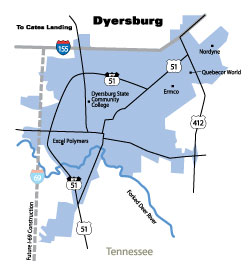Community Profile: Dyersburg, Tenn., Hopes I-69 Is the Road to Prosperity
|
|||||||||||||||||||||||||||||||||||||||
Interstate 69 is coming to Dyersburg, Tenn. Will additional traffic, hotels and restaurants follow? Dyersburg city officials hope so.
The NAFTA highway, as some people call I-69, will run from Canada to Mexico, the two biggest trading partners of the United States. The U.S. portion begins at Port Huron, Mich., and will end in the lower Rio Grande Valley of Texas, crossing eight states along the way.
Sixty-three percent of the nation’s truck traffic between Canada and Mexico runs through this part of the country, according to a U.S. congressional report. U.S. trade with Mexico alone has more than doubled since the North American Free Trade Agreement went into effect in 1994.
Dyersburg officials say the road, especially the portion from their city to Memphis, finally will provide a high-speed route for shipping goods.
"The trucks take Highway 51 to Memphis from here, and it’s very congested and you have a lot of stoplights," says Dyersburg Mayor Bill Revell. "Interstate 69 will make it easier and faster to ship goods from Dyersburg."
Although I-69 from Canada to Mexico will not be complete for at least a decade, the section from Dyersburg to Memphis may be finished in the next five or six years. The Tennessee Department of Transportation has decided to build I-69 through the western section of Dyersburg, much to the delight of most city and community officials.
The city’s commercial corridor lies along the west. That is where the hotels are, along with many of the restaurants and major retailers such as J.C. Penney and Wal-Mart.
"This is going to be an economic engine for our community," says David Hayes, the president and CEO of Dyersburg-based Security Bank.
Katie Winchester, a former board member of the Memphis Branch of the St. Louis Fed and the CEO of First Citizens National Bank, also based in Dyersburg, says, "This will have more impact on Dyersburg than any other event in my lifetime."
Another major construction project is making city officials optimistic about Dyersburg’s future. The U.S. Army Corps of Engineers is building a port about 25 miles northwest of Dyersburg, along the Mississippi River. To be called Cates Landing, the $20 million port should be finished in 2008.
Local officials say the port will attract steel and other industries that use barges to haul goods throughout the mid-South. Cates Landing is the only spot on the Mississippi between Cairo, Ill., and Memphis that lies above the 100-year floodplain.
Revell, the Dyersburg mayor since 1979, says that construction of I-69 and the building of the port will be "two of the biggest things to ever happen around here."
Hot Off the Presses
Popular magazines like Forbes, Motor Trend, Popular Mechanics and Cosmopolitan roll off the presses at Quebecor World in Dyersburg. The city’s largest employer prints about 2 million magazines and catalogs every day and then ships them on 18-wheelers to cities across the country.
Montreal-based Quebecor opened a 350,000-square-foot plant in Dyersburg in 1986, with about 200 employees. In the past 20 years, the plant has expanded twice, added dozens more magazines to its lineup and hired about 800 more employees. Today, the Quebecor plant is 940,000 square feet with presses that run 24 hours a day, seven days a week.
"We’re in a good location here," says Alex Elliott, the plant manager. About 75 percent of the country is one 24-hour truck drive away. "I think this area also is attractive for manufacturing because of the low cost of doing business."
Quebecor, along with the other industries in Dyersburg, is non-union. Workers may find the area attractive, in part, because the average price for a 2,400-square-foot, three-bedroom, two-bath house in Dyer County is $173,700, or about $35,000 less than the national average. Utility costs, apartment rental costs and health care also are cheaper on average in Dyer County than in the country as a whole.
Made in Dyersburg
Just a few decades ago, agriculture dominated the Dyer County economy. The area remains a major producer of soybeans (No. 2 in the state), wheat (No. 4) and other crops. Farming is a $61.1 million industry in Dyer County, but almost 40 percent of the county work force is employed in manufacturing.
Some of the other large employers in Dyersburg include: ERMCO (505 employees), which assembles distribution transformers and components; Excel Polymers (490 ), which makes plastic and rubber compounds; and Heckethorn Manufacturing (410), which produces exhaust clamps and other products for the auto industry.
Bekaert (277 employees) makes the steel cord that goes into most steel-belted tires manufactured in the United States. Workers at Caterpillar (174) assemble clutch housing and transmission parts for large construction equipment.
To recruit and maintain businesses, the city has enlisted the help of Dyersburg State Community College and the Tennessee Technology Center, in neighboring Newbern. Dyersburg State offers as many as 10,000 hours of customized training every year to assist local businesses and industries. The Tennessee Technology Center also provides customized vocational training classes, such as automotive technology, industrial maintenance and business systems technology. Local manufacturers pay for some of the training, while state grants pay for the rest.
Allen Hester, president and CEO of the Dyersburg/Dyer County Chamber of Commerce, says that towns like Dyersburg must work hard to prevent manufacturers from fleeing to low-wage countries such as China and Mexico.
"We love the manufacturing, and we want to keep all of the businesses, but, realistically, that may not happen," he says. "It’s important to maintain a high level of education and work training here. That will help us grow."
Views expressed in Regional Economist are not necessarily those of the St. Louis Fed or Federal Reserve System.
For the latest insights from our economists and other St. Louis Fed experts, visit On the Economy and subscribe.
Email Us


